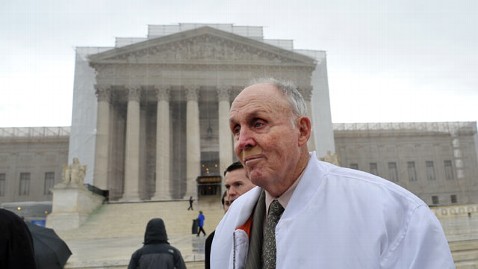Indiana Farmer Loses Battle Against Monsanto

(Image Credit: Mandel Ngan/AFP/Getty Images)
ABC News' Ariane de Vogue reports:
The Supreme Court ruled today against a 76-year-old Indiana farmer who had taken on Monsanto in a patent dispute over a genetically modified soybean seed.
"The question in this case," Justice Elena Kagan wrote for a unanimous court, "is whether a farmer who buys patented seeds may reproduce them through planting and harvesting without the patent holder's permission. We hold that he may not."
Monsanto developed the seed that is resistant to a powerful weed killer called Roundup.
READ MORE: Why Indiana Seed Farmer Took on Behemoth
Farmers pay a premium price for the seeds and enter into the contract with the company promising to buy new seeds for subsequent planting seasons. Monsanto makes the requirement in order to protect the company's investment and its patented technology. The seed is now used for more than 90 percent of soybeans grown in the United States.
Vernon Bowman has purchased the seed for years for his first crop and abided by the technology agreement. But for a more risky, second-crop planting later in the season, Bowman didn't want to invest in the expensive soy bean.
Second plantings are susceptible to the dangers of a short growing time and the threat of drought. He decided to take a risk and buy a mix of unlabeled seed from the local grain elevator hoping that most of it would be Roundup resistant. After harvesting that crop, he would save the progeny and replant it in the late 1990s.
Lawyers for Bowman argued in court that Monsanto's patent was exhausted after the first sale.
Monsanto sued the farmer in 2007.
"The court's ruling today ensures that longstanding principles of patent law apply to breakthrough 21st century technologies that are central to meeting the growing demands of our planet and its people," David F. Snively, executive vice president, secretary and general counsel of Monsanto said in a statement. "The ruling also provides assurance to all inventors throughout the public and private sectors that they can and should continue to invest in innovation that feeds people, improves lives, creates jobs, and allows America to keep its competitive edge."
Justice Kagan wrote, "In the case at hand, Bowman planted Monsanto's patented soybeans solely to make and market replicas of them, thus depriving the company of the reward patent law provides for the sale of each article."
She said that under the doctrine of patent exhaustion, the authorized sale of a patented article gives the purchaser, or any subsequent owner, a right to use or resell that article. But she cautioned, "Such a sale, however, does not allow the purchaser to make new copies of the patented invention."
Lawyer Edgar H. Haug said today that he had yet to get a hold of his client, Bowman. "Obviously, we are disappointed in the decision which affirms the finding of infringement," he said. "But beyond that we are particularly surprised that the Supreme Court did not use this case to address the possibility of self-replicating technology, more broadly. It appears to be a narrow holding in this case that only goes to farmer Bowman."
Kagan said that today's holding is "limited" and addresses only Bowman's situation "rather than every one involving a self replicating product."
She said she recognized that "in another case" at a time when inventions are becoming more prevalent, "the article's self-replication might occur outside the purchaser's control."
The case had been keenly watched not only by the biotechnology industry, but other industries as well.
Scott P. McBride, a lawyer at Chicago-based McAndrews, Held & Malloy Ltd., who filed a brief supporting Monsanto, said the court's language "may provide a red-flag to software patent-holders, as the court suggests that the intermediate replication that software undergoes outside of the purchaser's control is not infringing.
"But the limitation may prove inconsequential in the field of biotechnology. In biotechnology, replication generally requires the purchaser's control to ensure the right conditions for a commercially viable product."